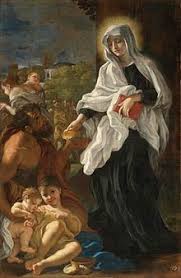HOMILY LENT WEEK 03 06 – Year II
Letting Go of Living in Illusion:
Optional Memorial of St. Frances of Rome
(Hosea 5:15b-6:6; Ps 51; Lk 18:9-14)
********************************************
Did you know that disillusionment is not necessarily a negative reality? It just means one was living an illusion, and has now become aware of it.
Today’s readings invite us to let go of any illusion regarding our faith life, become totally aware of who we are, our need for mercy, and come to God for forgiveness and healing.
The Pharisee in today’s gospel was living the illusion that he had no sin, and that his religious actions earned him God’s favor. He trusted in himself, to the point of praying “to himself!” That makes sense, because after the glory (shekinah) of God did not return to the second temple, the Pharisees concluded if they could keep the law perfectly, then the glory of God would return to the temple. Not only that, the Pharisee was judgmental, and looked on others with scorn.
The tax collector, on the other hand, had no illusions about himself. He knew he did not measure up and didn’t claim to be holy. He realized how needy he was and so he pleaded with God, “Be merciful to me a sinner.” What was lacking in the Pharisee’s prayer – humility, recognition of his need and repentance – made up the whole of the tax collector’s plea.
From the earliest days of the Church, we have made the tax collector’s prayer our own. In the Penitential Rite we pray, “Lord, have mercy.” Even in the Gloria we plead, “Have mercy on us.” These words have developed into the well-known Jesus prayer, “Lord Jesus Christ, Son of the living God, have mercy on me a sinner.” This is a beautiful profession of faith summing up the essentials of what we know and believe about our Lord. In these few simple words, we confess our sinfulness, we cry out for God’s mercy like the tax collector, and we open ourselves up to receiving God’s forgiveness and healing. According to the Catechism, this prayer is so powerful that “by it the heart is opened to human wretchedness and the Saviour’s mercy” (CCC 2667).
The first reading reflects the stance of the tax collector. Through the prophet Hosea, God is calling God’s people to come back to God, to repent, to enter into an intimate relationship with God, rather than dutiful observance or ritual behavior. God desires relationship more than ritual, steadfast love rather than sacrifice, and knowledge of God rather than burnt offerings. The psalm reiterates that statement by Hosea, and adds the dimension of being washed and cleansed, forgiven and healed, and the importance of a broken and contrite heart.
God wants merciful people, not heroic sacrifices. God want us to know how love works intimately and then we can put less emphasis on our gestures of self-sacrifice. The Pharisee is the common, heroic “sacrificer.” People often do not realize that this gesture largely feeds the ego and one’s sense of self much more than anything else. That is what God does not need. We need it. Sacrifice can easily and even unconsciously become our attempt to control God. It looks like we are giving, but there can also be a lot of “taking” mixed in. The social payoffs are so ego-inflating that our “sacrificing’ can become attempts to build a more positive self-image by distinguishing ourselves from others. Note the Pharisee’s words, “I am not like the rest of men, grasping, crooked and adulterous.”
In him, that self-serving dimension is clear, and precisely what we are to avoid. Jesus is not upset at sinners – he is only upset with people who do not think they are sinners! The Pharisee is a public “holy” man who is not holy at all. The tax collector in Israel is a public sinner, with no credits to his name whatsoever, who ends up being holy, the one forgiven and justified. We truly need to learn the meaning of the words, “What I want is mercy not sacrifice, knowledge of God, not burnt offerings in the temple.”

St. Frances of Rome
St. Frances of Rome, whom we honor today, is a great example for us. Happily married, the death of her two sons taught her compassion for others. She took food to the poor, and visited the sick and the needy in their homes to care for them. She gathered other women, mainly widows and young women who lived a life of prayer and cared for others, and founded a community of Benedictine Oblates. When her husband died, she joined their community. She died in 1440 and was declared a saint in 1608. She is patron of widows. What is striking in this description of her ministry is “they lived a life of prayer and cared for others” – contemplation and action. She is a wonderful model for us.
The Eucharist is just the opposite of any illusion. We humbly admit we are “tax collectors” in need of mercy in the penitential rite, experience God’s mercy as forgiveness and healing as we ponder God’s word and receive the very body and blood of Jesus.
May our celebration send us out, forgiven and healed, to share this good news of God’s unconditional love and mercy with the world.



